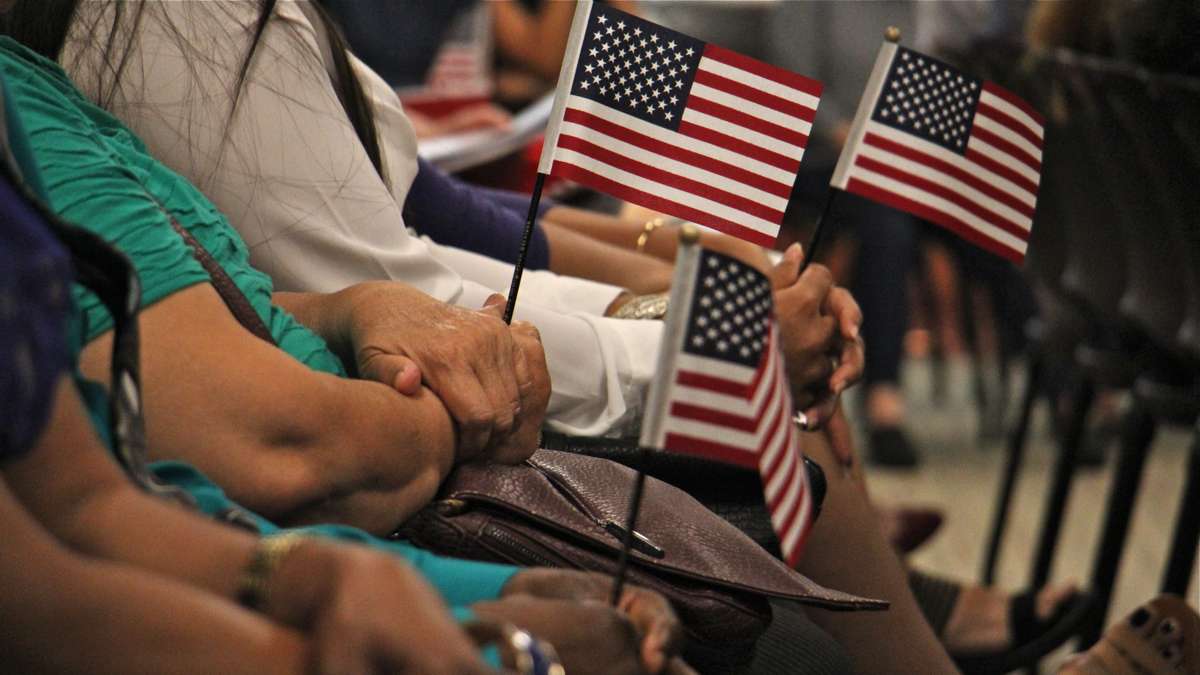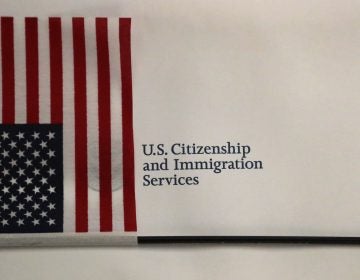Trump should expand understanding of ‘merit’ if he wants to replace diversity visa
Unlike the president, I believe that hard work and a hunger for a better life should be part of assessing 'merit.'

New citizens wait to take the oath of allegiance during a naturalization ceremony in Philadelphia. (Emma Lee/WHYY, file)
The White House’s latest immigration proposal includes a plan to completely eliminate the diversity visa program as part of larger effort to negotiate the status of the Deferred Action for Childhood Arrivals program. President Donald Trump and Republican leaders have also characterized the diversity visa program as a national security threat.
Trump has previously said that he would rather see a visa program based on “merit,” which would prioritize those with “job skills … and higher education” from across the world.
Through the diversity visa program, the State Department offers 50,000 visas through a lottery system to parts of the world with limited immigration to the U.S. Signed by President George H.W. Bush in 1990 after receiving bipartisan support, it was designed to advantage the Irish. Nowadays, the visas are awarded most to people from African nations.
I am not against an immigration proposal that would encourage bright and talented applicants to immigrate to the U.S. But, unlike the president, I believe that hard work and a hunger for a better life should be part of assessing “merit.”
Thanks to the diversity visa program, my family and I had the opportunity to leave Saudi Arabia, where my father worked, and start a new life in the suburbs of Philadelphia. While packing our bags in Jeddah, we didn’t have anything that I think Trump would consider “merit.” But we were hard workers with a desire to be part of the American identity.
Once we arrived, my father worked three jobs and was an amazing role model. He passed away before he could see me graduate from college, or become the youngest person ever appointed to our city’s planning commission, or go to an Ivy League law school — but I know he believed that all of those things were possible in America if we worked hard and contributed to the country that gave us so much.
The problem with basing the diversity visa program on a narrow definition of merit is that people like my father, who never had any material wealth other than his perseverance and determination, would be limited in their access to a better life. The program now ensures diversity in who is eligible to immigrate to the U.S. and serves as an equalizer for anyone across the world who aspires to the American Dream.
The president’s call to end the program as a way of strengthening national security is also mistaken.
Diversity visa applicants go through the same rigorous background check process as anyome who attempts to immigrate permanently and legally to the U.S. My parents provided all our health records, educational paperwork, and financial documents. They submitted mountains of personal information, all of it vetted before we even got to the interview room. It is difficult to imagine what additional procedures could be put in place to make the process more extreme. And it’s unclear if there is anything additional applicants can provide that they don’t already.
We also know that of those few who carry out terrorist attacks on U.S. soil, many have been radicalized while here, something no amount of extreme vetting could detect. As previously argued, ending the program could do more harm than good to national security. As Rhodes scholar Machmud Makhmudov wrote in the New York Times: “At a time when groups ranging from state-sponsored media to terrorist organizations denounce the United States as ‘the Great Satan,’ America can’t afford to turn its back on an opportunity to portray itself as an open, tolerant and diverse nation.”
Our nation faces vast challenges when it comes to securing our borders and fixing our immigration system. Wanting to improve the way we “award” the opportunity to pursue the American Dream is legitimate, but it comes with difficult questions we must answer. As we decipher how we want the world to see the next phase of American identity, I urge that policymakers consider people like my father, whose only credentials before coming to America were a strong work ethic and a desire to be part of the American Dream.
WHYY is your source for fact-based, in-depth journalism and information. As a nonprofit organization, we rely on financial support from readers like you. Please give today.





